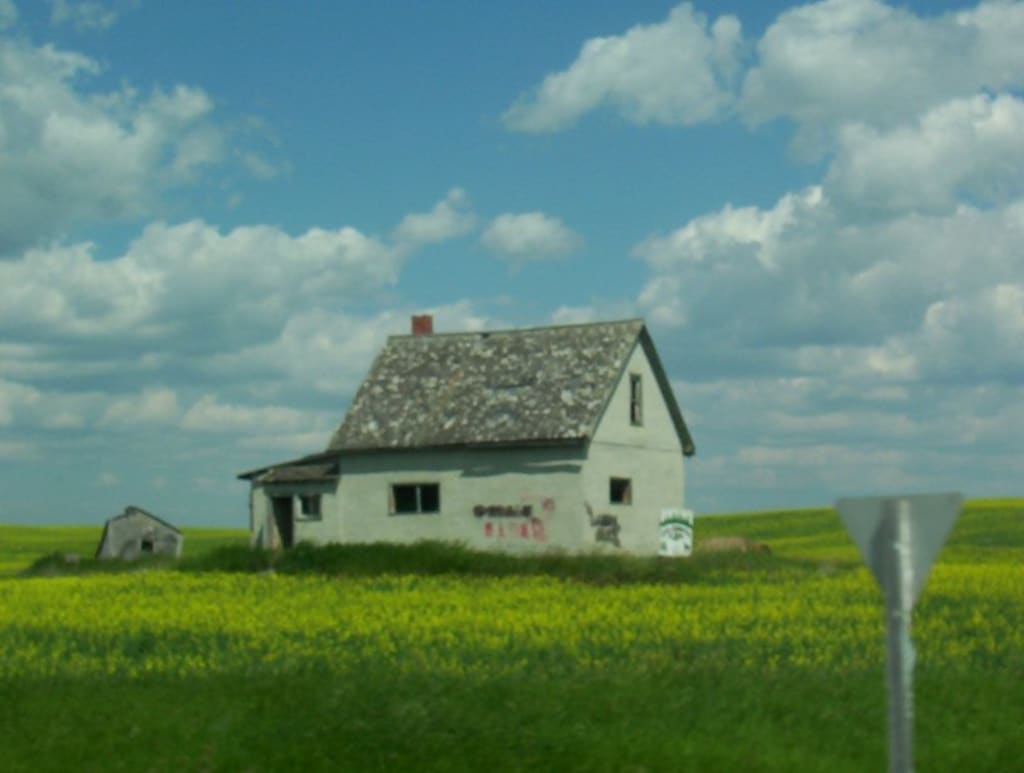
The casket was closed. It was the one thing Freddie cared about, and the only input he gave when they discussed the funeral. He let Lisa and Jeremy sort out the rest. He didn’t care if she was cremated or buried, what kind of wood they chose for the coffin, or where they held the service. All he requested was that the casket stayed closed.
It was closed because Freddie was ashamed of her, his mother. He thought about the last time he saw her, smoking in bed as her organs failed, too sick to attend his grandpa’s funeral, but not too sick to color her hair. It stood out against her fading skin, a violent, deep red. The casket was closed because he couldn’t bear to look at the color of her fucking hair.
He remembered the first time she dyed her hair, a beautiful periwinkle. It was also the first time she had visited them in Salem. “Blue for my boys,” she had said, and they had stroked her silvery blue strands until they fell asleep.
That was then, and this was now, and now they were burying her. Jeremy managed the funeral arrangements—the simple pine casket, the large displays of baby’s breath and carnations, the framed photos that decorated the table by the door. They painted her in a different light, as a loving mother and devoted daughter. It made him want to scream, to stand up in front of the casket and ask why they were having a funeral for a woman like her.
In fact, Freddie wasn’t sure why Jeremy had bothered to pay for a funeral at all. Their grandparents, who had raised them when she left, were dead. Her brother, her only sibling, asked if she had left enough to repay her debts. He was not in attendance. Neither Freddie nor Lisa could’ve afforded more than a cremation, and though Freddie thought the service was a waste of his brother’s money, he supposed Jeremy could do what he wanted.
He walked over to the display of photos Jeremy had collected. His brother, the dutiful son, had looked through hundreds of photos stored in their grandparents’ attic, choosing the ones that portrayed them as a happy family. There were several of his mother as a child, playing with her brother and cousins, smiling happily with her parents. The portrait from her high school graduation conveniently hid her belly; polaroids from that summer showed her glowing, holding her belly and laughing at their dad behind the camera. There were photos from their wedding, just weeks before Freddie was born. The rest of the photos were of her with her children: the Christmases before Lisa was born, random birthdays, Jeremy’s graduation from law school.
There was one photograph that stood out to Freddie. Their mother had visited for the first time after her release from Oregon State Hospital, where she’d spent eleven months undergoing treatment for postpartum psychosis. Her parents had helped her pay for a small apartment in the city and bought her a used Chevrolet. She had posed with her children in front of it, periwinkle hair piled high on her head, her white blouse blending into the chipping paint of the truck, grass stains on her blue jeans. She looked happy, balancing Lisa on one hip while her boys clung to her legs.
Freddie remembered that day. She had taken them out for ice cream. That evening, the boys had set the table while she cooked dinner, and they ate together, laughing and joking around. They sat on the porch, and she had pointed out constellations in the sky while they listened to the crickets in the field. She told them the crickets were singing for their reunion. When she left to go home, her truck had stalled in the driveway. She had to spend the night, curled up in a blanket fort with the boys. “Blue for my boys,” she had said. In the morning, she had made waffles for breakfast. Then she left, and they didn’t see her again for three months.
That was how it went: she was there, and then she wasn’t.
He felt his phone vibrate in his pocket, knew without checking that it was Annalee, calling to ask how the funeral went. She must have forgotten about the time change. He would call her later, even though he knew he should answer.
He had meant to tell her and had certainly never meant to keep the lie going for so long. It wasn’t even a lie, not really, but she didn’t see it that way. On their first date, she asked about his family, and he said, “My father died when I was seven, before my sister was born. My mother is dead, too.” It was essentially true, he had told himself, because his father was dead, and he hadn’t spoken to his mother in almost a year. He never corrected himself. He hadn’t meant any harm, but then Jeremy called and ruined it all. Well, almost—Annalee was angry, but understanding, even offering to fly across the country with him, but he had turned her down. That hurt her more than the lie, and Freddie didn’t know if she’d be waiting for him when he got back to Boston.
“Fred?” Lisa interrupted his thoughts, touching his arm lightly. “Are you alright?”
He turned to look at her, startled by how much she looked like their mother. He and Jeremy looked like their father, but Lisa had their mother’s small frame and cool blonde hair. Looking at her, he felt another surge of disgust towards his mother and her red hair dye. He wondered if she’d colored it again before she died, or if it had faded to pink.
“I’m fine,” he replied. “Just distracted.”
“For a moment, you looked…” she trailed off.
“I’m fine, really.”
“Oh.” She nodded. “Jeremy isn’t. He’s trying to hide it from you. He thinks you don’t care.”
He sighed. He had expected this, questions about his indifference, but not until after the service. “He’s right. I don’t.”
Lisa stiffened. “You don’t mean that.”
“I do.”
“Fred, that’s Mom!” she cried, her voice rising as she pointed at the casket. “How can you not care?”
“I don’t want to get into this right now. It doesn’t matter.”
“Why did you even come here? Why did you fly all the way here?”
“Because I’m supposed to be here for you, Lise. You and Jeremy.”
“Fuck you.” Lisa stormed off, no doubt in search of Jeremy, leaving Freddie alone in the room.
He walked over to the casket, letting his fingers run over the polished wood. He thought again about that day they had spent with her, when her Chevy broke down, and how she could’ve come back to them. Jeremy was too young to remember how things were before she went to the hospital, and Lisa had never known anything else; they didn’t know what it was like before, so they didn’t understand his resentment. They were mourning the loss of their mother now, but Freddie had mourned her for most of his life.
Later that night, they sat on their grandparents’ porch, eating a dinner of stale saltines, too-ripe bananas, and canned red wine. The kitchen was otherwise empty; their mother had sold most of the appliances when she inherited the farmhouse, and she hadn’t eaten much at the end of her life. Aside from the crackers and bananas, they had found a loaf of moldy bread and cans of expired tuna.
“What’s going to happen with the house?” Freddie asked. “Are we keeping it in the family?”
Jeremy scoffed. “Do you care?”
“I was just wondering.” He didn’t want to admit to his brother that he wanted to keep the house. It was the family home, where he grew up with his siblings.
“She died without a will, so the state decides what to do with the house. Why? Do you want it?”
“Like I said, I was just wondering.”
“I wish she’d left it to us,” Lisa said. “It’s Grandma and Grandpa’s house. I don’t want someone else to have it.”
“Why didn’t you make her write a will?” Freddie aggressively asked his brother. “You’re a lawyer.”
“You can’t make someone write a will. And she wasn’t obligated to leave us anything.”
“She should’ve.”
“Shut up,” Jeremy muttered. “I don’t want to do this right now. I just buried our mother.”
They sat in silence for a few minutes, listening to the crickets. They had loved running through the fields as children, playing hide-and-seek in the overgrown grass. The farm was their great-grandfather’s, though nothing had grown in the fields for decades. Their grandmother kept a garden, but their grandfather was more interested in working at an accounting firm than farming. He kept the farm and raised the family there. Lisa was right; it was home.
“Do you think she loved us?” Freddie asked after a moment. It came out harsher than he’d planned, almost accusatory, but he felt it was a fair question. In his pocket, his phone rang again. Shit. He’d forgotten all about Annalee.
“Don’t be an ass, Fred,” Lisa said, taking a drag of her cigarette. She poured herself another glass of wine before handing the bottle to him. “You know Mom loved us.”
“Sometimes I’m not sure.”
“What the fuck is wrong with you?” Jeremy asked. “Of course she loved us.”
“She could’ve been around more.”
“You know why she wasn’t around,” Lisa said.
“Yeah, I do. Do you?” He was met with silence. “You know she was sick, but you don’t remember it. I do. She was depressed after Dad died, and she got worse after Lisa was born. I remember her pacing in her room every night, barely sleeping, the scratches on her arms because she thought there was a tracking device buried under her skin.”
“Fred, stop.”
“She was convinced Lisa wasn’t her baby,” he continued, more than a little drunk. “I remember how insistent she was that the hospital switched her baby, that her real baby was taken as part of some conspiracy, that they’d given her a doll.”
“I didn’t know that,” Lisa whispered.
“Because Grandma didn’t want you to know.”
“Why don’t I remember any of that?” Jeremy asked, as if because he couldn’t remember, it couldn’t be true.
“You weren’t even four.”
“That’s why they sent her away?” Lisa asked.
“She tried to leave you at the grocery store,” Freddie said matter-of-factly, taking a large swig of wine. “You were three weeks old. I told the kid pushing carts in the parking lot that she left you in the bathroom and she freaked out, screaming how you weren’t her baby and she had to find her real baby, that she couldn’t take you back home and keep you around us, her real kids. Grandma got custody and Mom got sent away and never got better.”
His siblings were silent. No one had told them the truth; their grandparents wanted to protect them, told Freddie it was his job to protect them. He was tired of protecting them. He couldn’t pretend their mother was anyone but who she was, not anymore. He had lost both of his parents when his dad died. It wasn’t Jeremy’s fault, and it certainly wasn’t Lisa’s, but he couldn’t listen to their judgement for the rest of his life.
Freddie stood up, finishing the can he was drinking. “I don’t really care that she’s gone. She wasn’t there to begin with.” He left Jeremy and Lisa on the porch and walked out into the fields to join the crickets.
About the Creator
Katherine J. Zumpano
poet & writer in the pnw
wwu alum
pieces in southchild lit, jeopardy mag & more
social media: @kjzwrites
Enjoyed the story? Support the Creator.
Subscribe for free to receive all their stories in your feed. You could also pledge your support or give them a one-off tip, letting them know you appreciate their work.






Comments
There are no comments for this story
Be the first to respond and start the conversation.